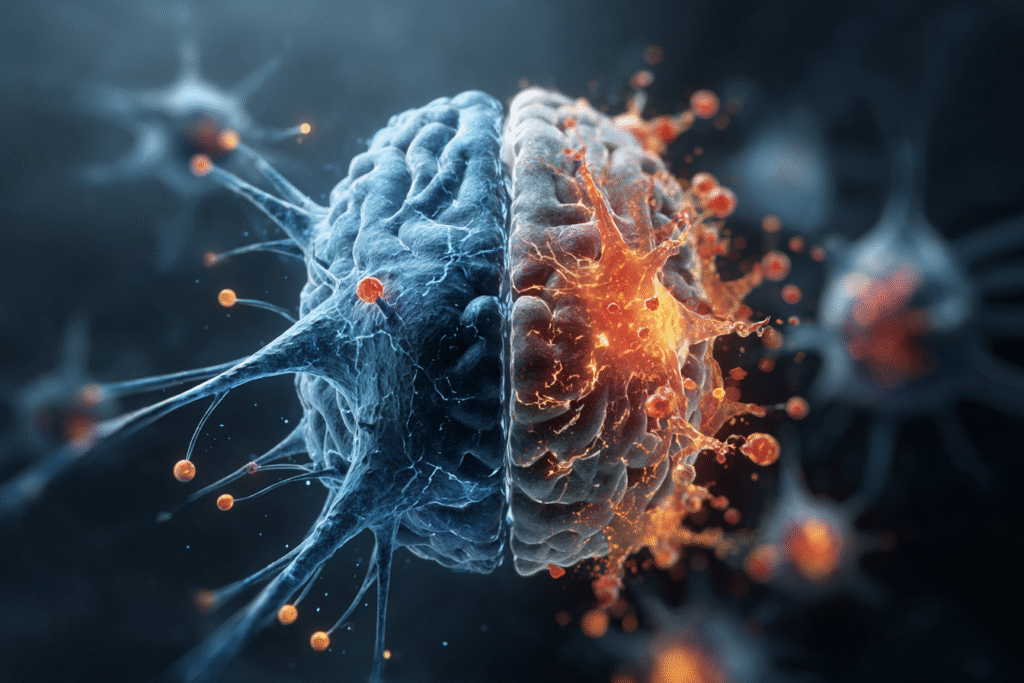Scientists perplexed themselves over many decades why so many individuals with psychiatric or neurological disorders do not respond to conventional treatment. Schizophrenia, depression, bipolar disorder, autism, and Alzheimer disease still feature among the most prevalent causes of disability on the planet. Existing treatments, which are usually directed at chemical agents of the brain, such as serotonin and dopamine, help not everyone.
Another player with a lot of power is the immune system, which has been illuminated in a new breakthrough study published in Molecular Psychiatry (April 2025). Scientists have discovered a total of 29 immune related biomarkers with potential causal effects on major psychiatric, neurodevelopmental and neurodegenerative disorders.
Better still, most of these biomarkers are associated with proteins that are already targets of available medications.
The discovery may change the way we perceive (and ultimately treat) brain disorders and mental health.
Brain Health Why the Immune System Matters.
The notion that inflammation is somehow related to mental health is not novel. Individuals on immune activating medications (hepatitis C, etc.) tend to experience depressive symptoms. In large studies, people with autoimmune illnesses or long term infections are at increased danger of schizophrenia, attention deficit hyperactivity disorder (ADHD), depression, and Alzheimer.
But these discoveries posed an important question: Is the brain disorder a cause or merely a by product of immune defects?
The researchers employed a state of the art technique known as Mendelian randomization (MR) to answer this. This method makes use of inherent genetic variability to determine whether some immune biomarkers are causal, and not simply correlated.

What the Study Did
The global collaboration compared genetic and protein information of more than 34,000 individuals with 736 biomarkers of the immune system detected in blood and the brain tissue. They studied how they could affect seven key conditions:
Schizophrenia
Bipolar disorder
Depression
Anxiety
Autism
ADHD
Alzheimer’s disease
They combined various genetic analyses to construct a triple level structure of evidence to find the most robust causality candidates.
Key Findings
There were 29 biomarkers with high levels of causality.
These contained inflammatory and immune pathway proteins and genes.
The strongest immune connections were with schizophrenia and Alzheimer’s.
Schizophrenia had 57 immune associations, Alzheimer’s 28 and depression and bipolar disorder followed.
The immune response of the brain is as well as that of the body.
The effects were not all limited to the brain-systemic inflammation in the blood also contributed.
20 biomarkers are druggable.
Proteins such as ACE, AGER, CD40, SERPING1 and TNFRSF17 were some of the strongest findings; all of which have drugs currently available or in clinical trials for other diseases (such as hypertension or autoimmune diseases). This opens up promising prospects of drug repurposing.
Condition specific insights:
Schizophrenia: NAGA, AGER, PDIA3, and others.
Depression: There was good evidence of a gene named EP300.
Bipolar disorder: A new protein, SCRN1, came into view as a prospect.
Alzheimer: CR1 and APOC1 were significantly involved, as per previous results they are related to dementia.
Why this is important to patients.
In recent decades, there has been little advancement in mental health treatments yet people who fail to respond to standard medications have no alternative. This paper presents a road-map to the development of new therapies, by identifying immune-related targets capable of fueling disease at its core.
For example:
ACE influencing drugs (commonly used to treat blood pressure) could also have a role in schizophrenia or Alzheimer.
The development of anti-inflammatory approaches against CD40 or AGER may provide new treatment opportunities in psychosis and mood disorders.
Assuming this is validated in subsequent trials, it can bring psychiatry one step closer to personalized medicine, where one is treated based on his or her immune profile, as opposed to symptoms.
Limitations and Next Steps
The researchers warn that their results are not the last word. The vast majority of genetic information was obtained on individuals of European descent and does not provide a full picture of the generalizability of findings to other groups. Also, genetics is useful in making inferences about causality, which can only be proved through clinical trials.
Further research should:
Measure these biomarkers in more heterogeneous groups.
Understand the role of immune dysfunction that can be initiated in early life that can influence the evolution of the brain.
Test whether symptomatic or disease-progression benefits are obtained by targeting these pathways.
Conclusion
This historic research reinforces the idea that inflammation is not merely a side effect, but may be a cause of psychiatric and brain disease. It highlights 29 immune biomarkers, and demonstrates that 20 of them interrelate with drugs that are druggable, novel approaches to treatment beyond the classic drugs targeting neurotransmitters.
New treatments to address not only symptoms but the underlying biological causes of diseases such as schizophrenia, Alzheimer’s and depression may be offered to patients in the future as researchers progress to decipher the linkage of the immune system and the brain.
References & Resources
Dardani C, Robinson JW, Jones HJ, et al. Immunological drivers and potential novel drug targets for major psychiatric, neurodevelopmental, and neurodegenerative conditions. Molecular Psychiatry. 2025. doi:10.1038/s41380-025-03032-x
Global Burden of Disease Study 2019. Lancet Psychiatry. 2022.
Sun BB, et al. Plasma proteomic associations with genetics and health in the UK Biobank. Nature. 2023.

